Top 7 Cloud Tools for Inventory Forecasting
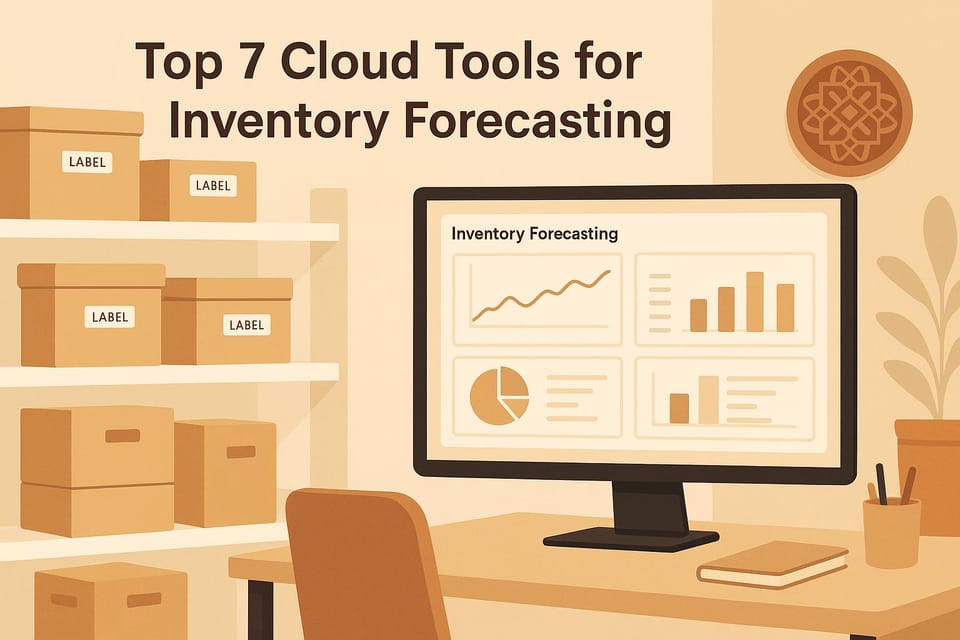
Managing inventory is critical for businesses in Bahrain and the GCC, especially with the logistics market projected to grow from USD 47.59 billion in 2023 to USD 66.61 billion by 2029. Poor forecasting can lead to stockouts or overstocking, increasing costs and customer dissatisfaction. Cloud-based tools simplify this process with real-time tracking, AI-driven forecasts, and multi-channel management. Here's a look at seven tools suited for businesses in Bahrain:
- Omniful: Tailored for the GCC, it offers real-time tracking, AI-based forecasting, and local currency support.
- Zoho Inventory: Popular among SMEs, it integrates with e-commerce platforms and supports VAT compliance.
- LOGIC ERP: Ideal for complex operations, it provides granular tracking and multi-location management.
- SAP EWM: Enterprise-level solution with AI forecasting and advanced analytics.
- Blue Yonder: Processes over 25 billion AI predictions daily, optimizing inventory across supply chains.
- QuickBooks Commerce: Connects inventory with QuickBooks Online for SMEs managing multiple sales channels.
- Oracle NetSuite WMS: Combines inventory tracking with ERP functions, supporting 190 currencies globally.
Quick Comparison
| Tool | Key Features | Best For | E-commerce Integration |
|---|---|---|---|
| Omniful | Real-time tracking, AI forecasting | GCC businesses | Shopify, WooCommerce |
| Zoho Inventory | Multi-channel sync, VAT support | SMEs | Amazon, Shopify, Magento |
| LOGIC ERP | Detailed tracking, ERP integration | Large enterprises | Custom integrations |
| SAP EWM | AI analytics, VAT compliance | Large enterprises | SAP ecosystem |
| Blue Yonder | AI-powered predictions | Multi-location operations | Multiple platforms |
| QuickBooks | Multi-channel management | SMEs | Amazon, Shopify |
| Oracle NetSuite | AI forecasting, mobile tools | Medium to large businesses | Global platform integrations |
These tools help businesses in Bahrain forecast demand, reduce costs, and improve efficiency while meeting regional requirements like VAT compliance and climate-controlled storage needs.
1. Omniful
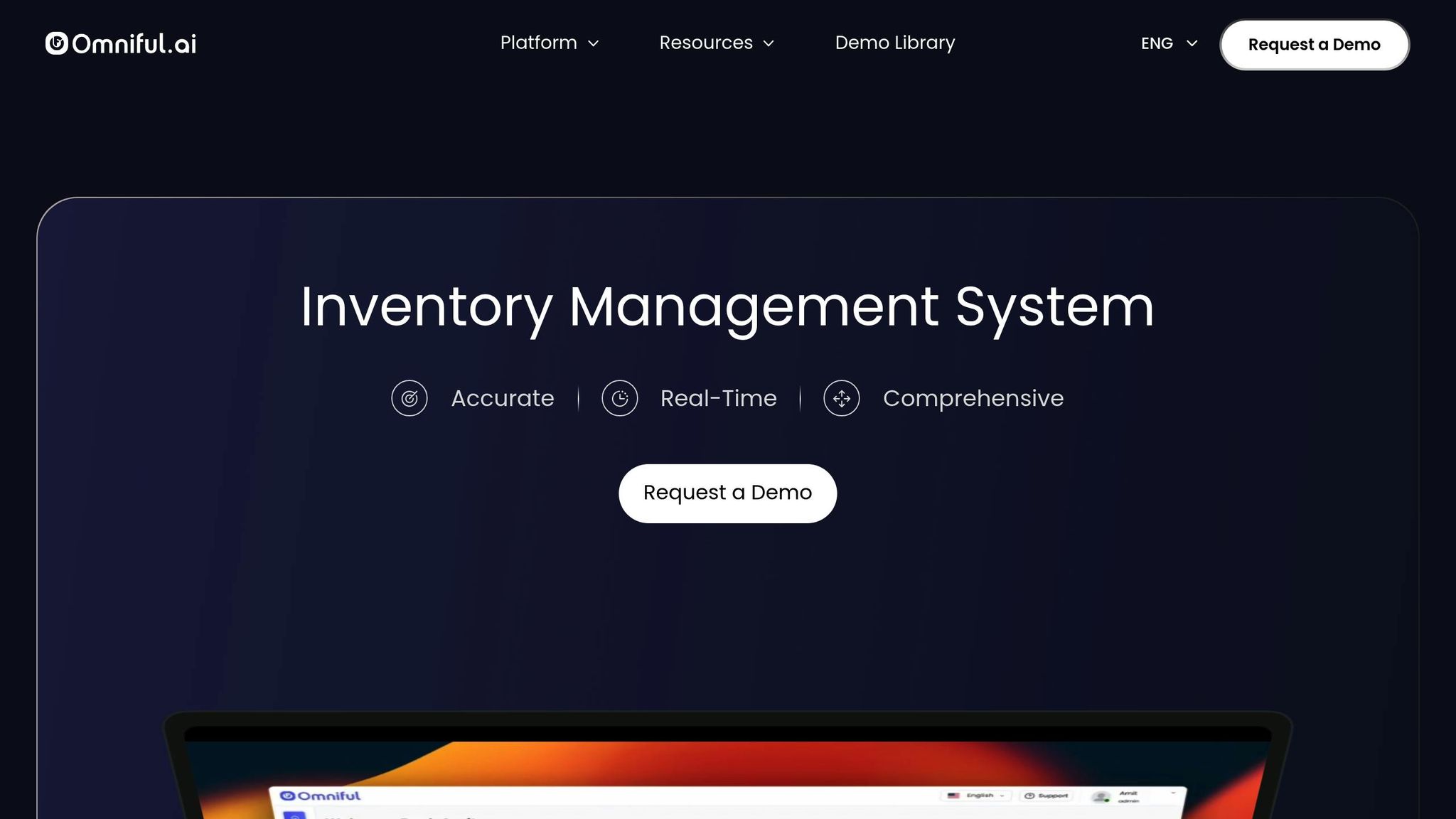
Omniful is a cloud-based inventory management platform tailored for businesses in the Middle East, including Bahrain. With its Arabic-friendly interface and compliance with regional regulations, it's an ideal choice for GCC businesses aiming to modernise their inventory forecasting processes. Let’s dive into the features that make Omniful stand out.
Real-time inventory tracking and analytics
Omniful offers real-time inventory tracking, giving businesses instant visibility into their stock levels across all channels. This eliminates the guesswork that often causes costly stockouts or overstocking issues, improving operational efficiency for businesses managing multiple locations or sales platforms.
The platform’s advanced tools - like cycle counts, batch management, and serialisation - enhance inventory accuracy and traceability. These features are especially useful for Bahraini businesses needing precise records to meet regulatory or quality control standards. Studies show that real-time tracking can reduce inventory discrepancies by up to 85%, illustrating how accurate, up-to-date data can transform inventory management. By setting a strong foundation, these features pave the way for more advanced forecasting.
AI-powered forecasting capabilities
Omniful leverages AI-driven forecasting to help businesses predict market demand and adjust inventory levels accordingly. By analysing historical sales data, seasonal trends, and market behaviours, the platform provides accurate forecasts that minimise the risks of stock shortages or excess inventory.
The AI tools go beyond simple predictions. For example, they automate stock transfers between warehouses, ensuring high-demand areas are always well-stocked. Dashboards powered by AI offer key insights, such as turnover rates, SKU freshness, and low stock alerts, helping businesses make smarter decisions.
Multi-channel or multi-location management
For businesses operating in multiple locations across Bahrain or the GCC, Omniful’s capabilities simplify inventory management. Its AI-powered warehouse management system recommends optimal storage setups and streamlines order processing, making it easier to handle inventory across various facilities.
The system also accommodates Bahrain’s diverse commercial needs, supporting multiple currencies and metric measurements. This eliminates conversion errors, a common issue with platforms not designed for regional requirements.
Integration with local and global platforms
Omniful’s regional focus is evident in its integrations, such as ZATCA compliance for Saudi Arabia and other features tailored to Middle Eastern businesses. These integrations align with local regulations and business practices, ensuring seamless operations across the GCC.
A case study from The Laverne Group in Saudi Arabia highlights how Omniful achieved 100% inventory accuracy and faster delivery times. This success story showcases how the platform’s comprehensive tools can deliver tangible benefits for regional businesses.
Additionally, Omniful addresses the rising demand for rapid delivery in the region, where over 60% of MENA customers expect same-day or next-day delivery. By integrating with local and global platforms, Omniful helps businesses meet these expectations while maintaining accurate inventory forecasting. Its focus on regional needs and proven success stories position it as a key player in advancing inventory management across the GCC.
2. Zoho Inventory
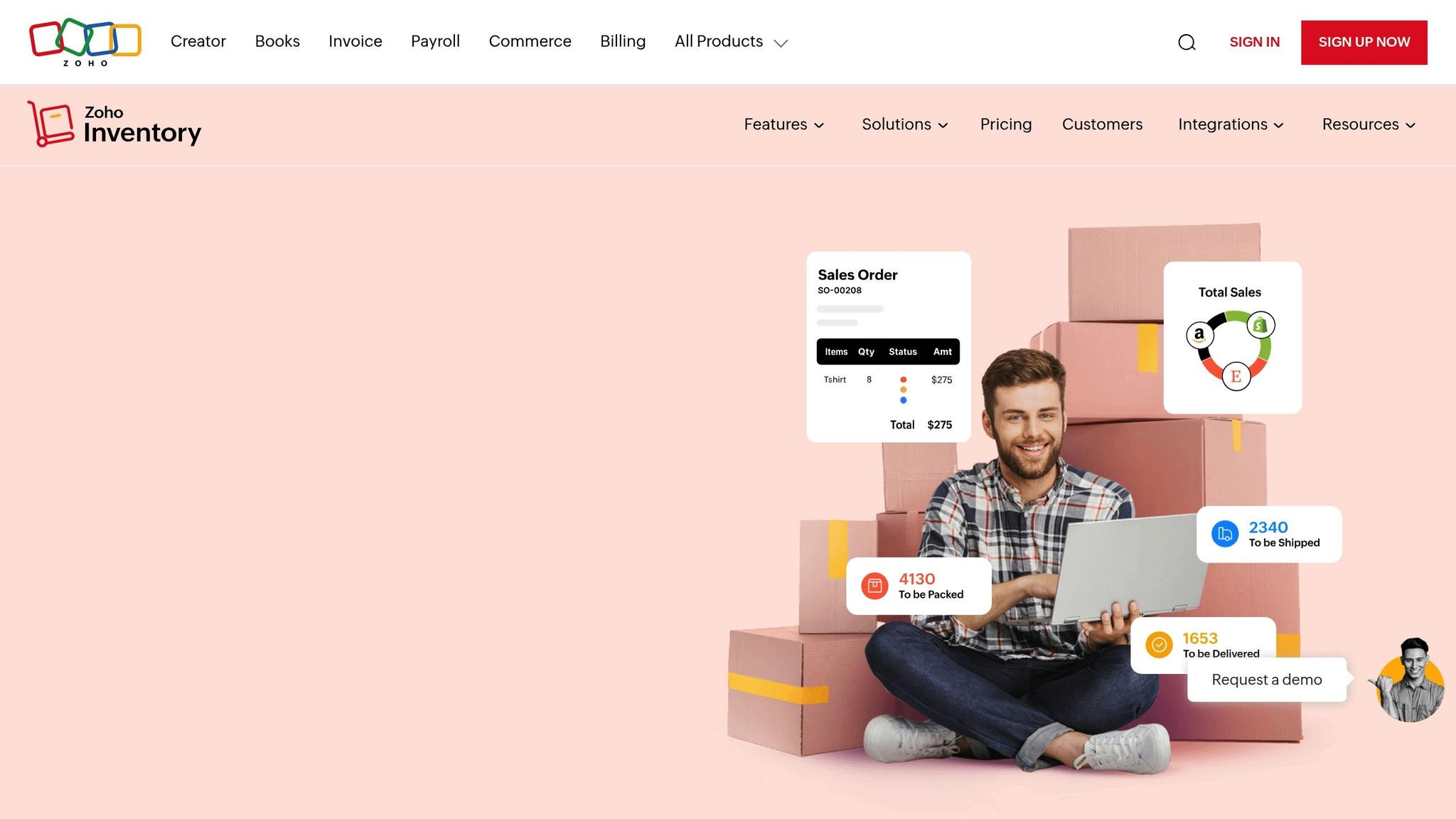
Zoho Inventory is a cloud-based inventory management system designed to meet Bahrain's specific business needs, particularly in forecasting. The platform has seen notable growth within the GCC region, thanks in part to its strategic partnership with Tamkeen, which aims to promote digital transformation for Bahraini SMEs. With a reported 28% increase in revenue within Bahrain and a planned investment of $5 million into local startups over the next five years, Zoho is clearly committed to supporting the regional market.
Real-time Inventory Tracking and Analytics
Zoho Inventory offers robust tools for tracking shipments, managing inter-warehouse transfers, and maintaining up-to-date stock levels. Its analytics engine provides valuable insights into sales performance, turnover rates, and warehouse operations, helping businesses make informed decisions. The platform's AI assistant, Zia, enhances this further by delivering detailed reports and actionable KPIs. From analysing orders and invoices to monitoring low-stock alerts, Zia helps businesses optimise stock handling and improve overall efficiency.
Multi-Channel and Multi-Location Management
For businesses in Bahrain operating across different sales channels, Zoho Inventory simplifies multi-channel selling. It integrates seamlessly with digital storefronts, ensuring stock levels are synchronised across platforms. The system also supports multi-currency transactions, making it easier to manage international sales without compromising accuracy in inventory management.
Integration with Local and Global Platforms
Zoho Inventory connects effortlessly with major e-commerce platforms like Amazon, eBay, Etsy, and Shopify, allowing businesses to manage inventory from one unified dashboard. Additionally, it integrates with tools like Zoho Books, Zoho CRM, Google Shopping, USPS, Easyship, and Slack, streamlining operations across the board. The platform also supports real-time rate comparisons with various shipping carriers and simplifies logistics with automated shipping label generation. Payment gateway integrations further enhance the user experience by enabling smooth online transactions. Moreover, Zoho's inclusion of Right-to-Left (RTL) functionality highlights its dedication to Arabic-speaking users in the GCC region.
"This agreement with Zoho is aligned with our commitment to empowering Bahraini SMEs to embrace technology and transform digitally to enhance their productivity and sustainability. We do that by partnering with large international and local entities that can enable digital transformation."
– Maha Abdulhameed Mofeez, Tamkeen CEO
The partnership between Tamkeen and Zoho is specifically tailored to support Bahraini SMEs, equipping them with tools for digital transformation that align with Tamkeen's strategic goals for 2025. With its comprehensive features and regional focus, Zoho Inventory plays an essential role in modern inventory forecasting, paving the way for other advanced solutions in the market.
3. LOGIC ERP
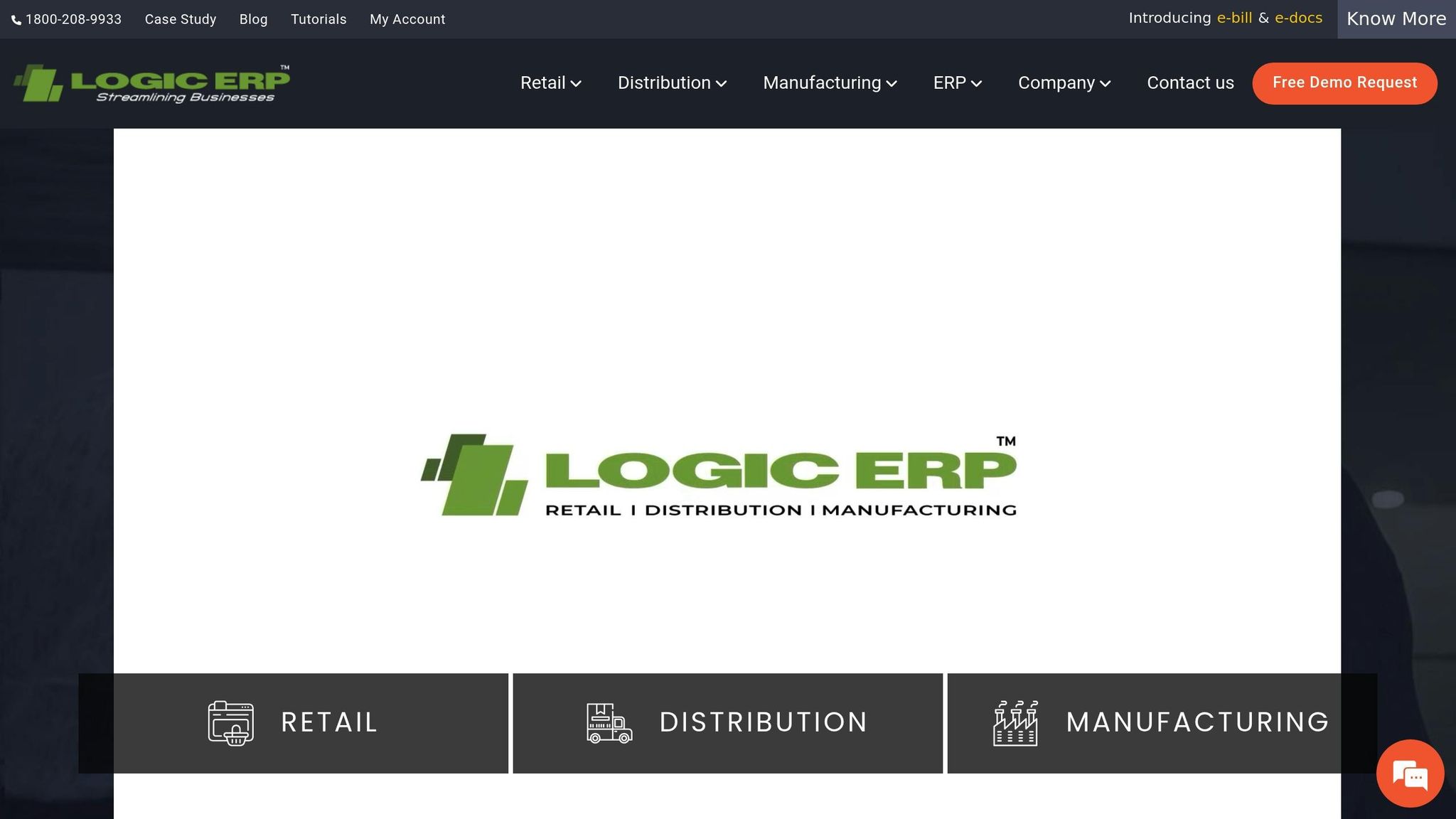
LOGIC ERP is making waves in the GCC with its powerful cloud-based solution, offering a mix of forecasting tools and seamless integration capabilities. Designed for growing businesses in Bahrain, it’s particularly useful for managing complex inventory operations across multiple locations and sales channels.
Real-time Inventory Tracking and Analytics
LOGIC ERP provides detailed inventory tracking at every level - whether it’s item-wise, batch-wise, or lot-wise - across various branches and warehouses. This granular visibility ensures businesses have a complete picture of their stock movements.
"LOGIC ERP Inventory Management Software provides a comprehensive solution to manage and track your inventory. Inventory can be tracked Item Wise/Batch or Lot Wise/Each Pcs wise through multiple godowns and branches. LOGIC ERP Inventory software also helps you keep track of dead and slow-moving stock so that you can move your inventory accordingly." - LOGIC ERP
Its analytics tools deliver real-time insights, helping businesses make smarter decisions. Features like multiple units of measure, automated barcode generation, and advanced reporting tools help optimise stock levels and reduce costs. Plus, its cloud-based setup allows remote access, ensuring flexibility and convenience for users.
By offering such precision, LOGIC ERP simplifies the complexities of multi-channel operations.
Multi-Channel and Multi-Location Management
For businesses operating across various sales channels and locations, LOGIC ERP is a game-changer. It has enabled brands to expand into new markets within the GCC. A great example is The Bear House, an Indian apparel brand, which successfully used LOGIC ERP to manage its omnichannel operations as it entered the GCC. The brand operated across platforms like Noon, Namshi, and Amazon, demonstrating the software's effectiveness.
The system keeps inventory levels synchronised across online and offline channels, which is vital since customer purchase rates on omnichannel platforms are 250% higher, and average order values are 13% greater compared to single-channel platforms.
These features are further enhanced by its robust integration capabilities.
Integration with Local and Global Platforms
LOGIC ERP connects seamlessly with both local and global e-commerce platforms, streamlining B2C order management and dispatch. Its API integration supports custom e-commerce businesses, while partnerships with platforms like Unicommerce, Vinculum, and eShipz ensure smooth operations.
"At LOGIC ERP, we are proud to support innovative Indian brands like The Bear House in their global journeys. Our integrated retail solutions ensure that operations - from inventory to order processing - run seamlessly across geographies. The brand's entry into the GCC region is a testament to the power of technology-backed growth, and we look forward to being part of their continued success story." - Gurbir Singh, MD and Co-founder of LOGIC ERP
This integration framework not only simplifies operations but also boosts customer engagement and delivers measurable ROI improvements.
For businesses in Bahrain considering LOGIC ERP, the platform offers demonstration sessions to showcase its capabilities. These sessions provide a hands-on look at how its cloud solutions and integrations can be tailored to meet specific retail needs, helping businesses evaluate their potential return on investment before committing.
4. SAP Extended Warehouse Management (SAP EWM)
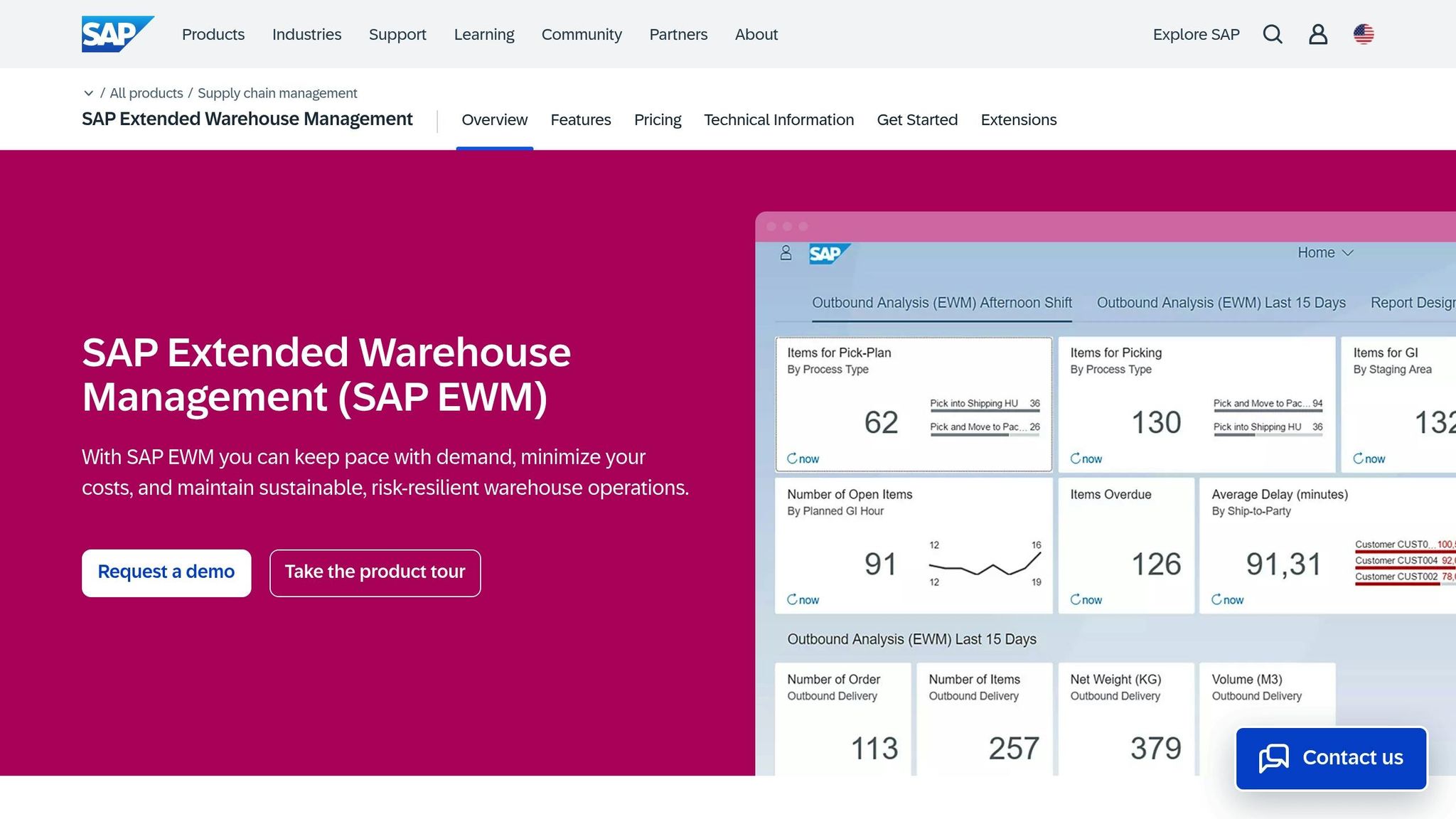
SAP Extended Warehouse Management (SAP EWM) is a robust cloud-based platform designed to enhance inventory forecasting in Bahrain. This enterprise-level solution blends traditional warehouse management tools with advanced artificial intelligence, providing precise inventory predictions and streamlining operations across complex supply chains. Its ability to handle multi-channel and multi-location demands makes it a perfect fit for Bahrain's fast-evolving market.
AI-Powered Forecasting Capabilities
SAP EWM leverages artificial intelligence to take inventory forecasting to the next level. By applying machine learning, it analyses historical picking and packing data, inventory turnover rates, and product demand patterns. This allows it to predict workloads, recommend optimal storage locations, and even reduce inventory levels by an average of 35%. Seasonal trends and real-time data are used to forecast workforce needs, ensuring businesses can maintain optimal staffing levels throughout the year. The system continuously refines its predictions, adapting to changing market conditions and improving accuracy over time.
Real-Time Inventory Tracking and Analytics
With SAP EWM, businesses gain real-time visibility into every aspect of their inventory operations. Its analytics engine processes data from various touchpoints, providing actionable insights that help optimise stock levels and lower carrying costs. The platform integrates data from sources like point-of-sale systems, ERP platforms, and customer relationship management tools into a single database. This seamless integration ensures smooth data processing for its AI algorithms. One retail chain reported a 20% boost in productivity and a 2–5% reduction in tariffs after adopting SAP's integrated transportation management system. Such real-time tracking and analytics are vital for managing inventory efficiently across multiple locations.
Multi-Channel and Multi-Location Management
As Bahrain's businesses increasingly adopt cloud-based solutions, SAP EWM stands out by synchronising inventory across multiple channels and locations. Whether it's warehouses, distribution centres, or retail outlets, the platform ensures unified and accurate stock visibility. Its advanced algorithms analyse demand patterns across different locations and channels, helping businesses optimise inventory distribution and significantly reduce the risk of stockouts.
Integration with Local and Global Platforms
SAP EWM is designed for seamless integration, connecting with both local GCC platforms and global enterprise systems. Its API framework supports custom integrations, enabling businesses to link with regional e-commerce platforms, local banking systems, and government trade portals.
"We are thrilled to offer a solution that allows warehouse personnel to perform their tasks more efficiently and accurately. Inventory Manager for SAP brings the power of SAP directly to the warehouse floor."
- Phillip Avelar, managing partner Advanced Solutions
For organisations using the SAP EWM Private Cloud Edition, the SAP Preferred Success Business AI Accelerator Service is available. This service helps businesses set and achieve specific goals, such as improving forecasting accuracy or lowering carrying costs. Before rolling out SAP EWM, companies should assess their current inventory systems to identify inefficiencies and data gaps.
5. Blue Yonder Warehouse Management
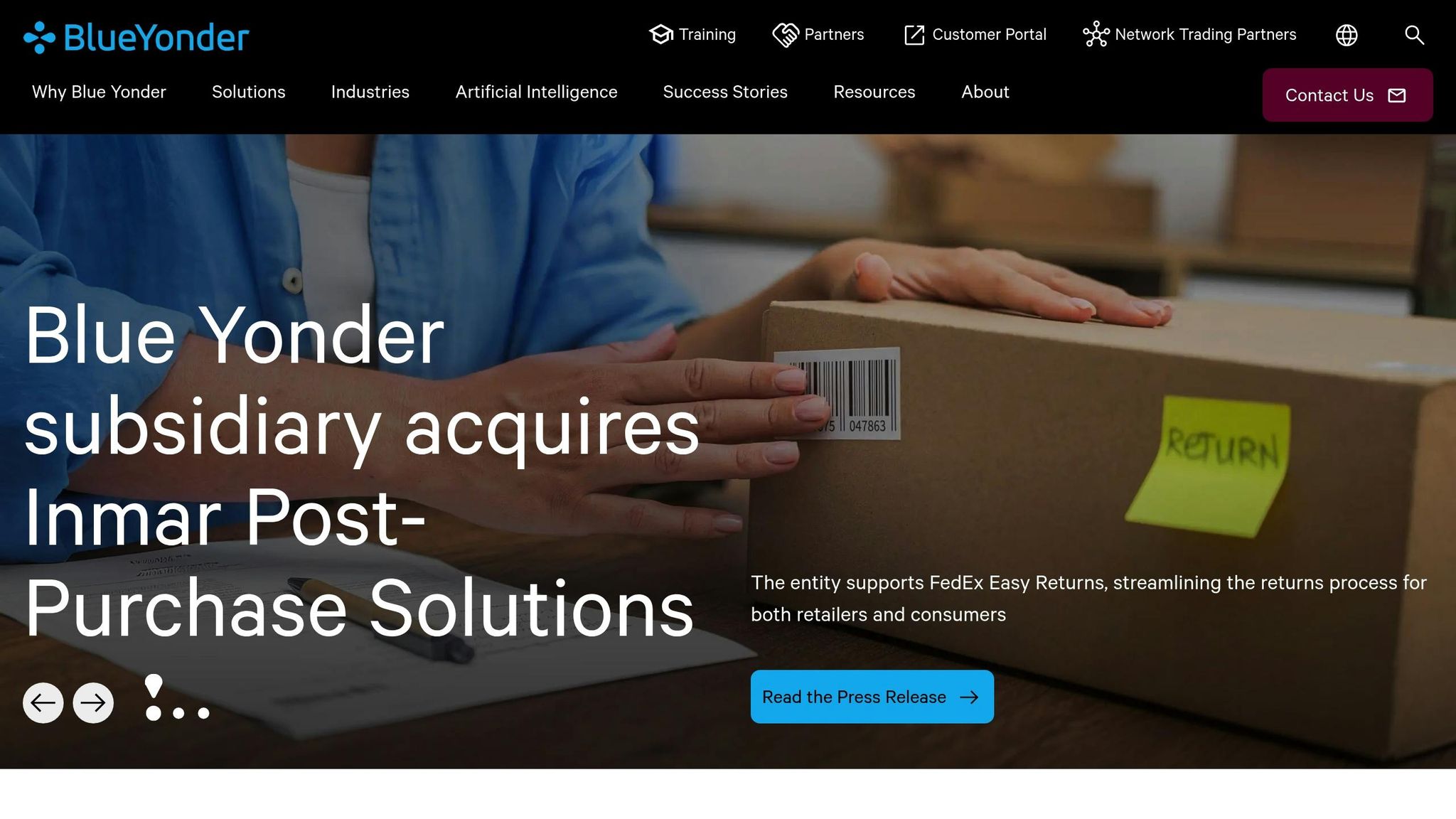
Blue Yonder Warehouse Management is reshaping inventory forecasting with its use of AI and real-time analytics. With over 25 billion AI predictions processed daily, it stands out as one of the most data-driven solutions available to businesses in the GCC region. Its ability to manage complex, multi-location operations with precision makes it an excellent choice for growing enterprises in Bahrain and beyond.
AI-Powered Forecasting Capabilities
Blue Yonder's forecasting capabilities are powered by its advanced Cognitive Solutions, which use built-in AI to autonomously manage tasks, decisions, and workflows across entire supply chains. This allows businesses to adapt quickly and accurately to market changes.
For instance, Mahindra & Mahindra achieved a 10% improvement in forecast accuracy, while Swire Coca-Cola reduced changeover times by 6% using Blue Yonder's AI-driven solutions.
"With more than 25 billion AI predictions being delivered every day, Blue Yonder is taking supply chains to the next level with our AI agents."
- Duncan Angove, CEO, Blue Yonder
Real-Time Inventory Tracking and Analytics
The platform ensures complete inventory visibility through real-time tracking, which has been shown to boost throughput by 50% while cutting fulfilment, storage, and handling costs in half. Its analytics engine provides continuous data processing, offering managers detailed dashboards to help them make smarter, data-driven decisions.
Multi-Channel and Multi-Location Management
Blue Yonder excels at managing distributed operations by centralising multi-site warehouse management. This enables seamless inventory oversight across multiple GCC locations. The platform is designed to handle warehouses of various sizes and complexities, making it adaptable to different distribution models and business growth without compromising performance.
A great example is Silk Logistics Holdings (SLH) in Australia, which used Blue Yonder to boost operational efficiency, lower costs, personalise services, and enhance customer satisfaction - all while driving revenue growth. This ability to unify multi-channel operations also simplifies broader system integrations.
Integration with Local and Global Platforms
Blue Yonder WMS supports flexible API integrations and works seamlessly with ERP systems like Oracle and Microsoft. This adaptability makes it particularly useful in Bahrain's diverse business landscape, where companies often rely on a mix of enterprise systems. By breaking down data silos, the platform enables better decision-making and creates a unified operational ecosystem.
It also synchronises forecasting, planning, warehousing, transportation, and order fulfilment, ensuring smooth operations. Companies like Henkel have leveraged Blue Yonder to enhance speed, accuracy, efficiency, service levels, and profitability across their distribution centres.
"Our AI agents empower customers to see, analyse, decide, and act. They respond swiftly to disruptions, minimise delays, and uncover growth opportunities."
- Duncan Angove, CEO of Blue Yonder
Blue Yonder's leadership in the Warehouse Management Systems space has been recognised by Nucleus Research, which ranked it highest for functionality in their Value Matrix. However, businesses should be aware that implementing Blue Yonder WMS requires substantial planning and resources upfront. Its longer deployment timelines and higher initial costs may be challenging for companies seeking simpler solutions.
6. QuickBooks Commerce
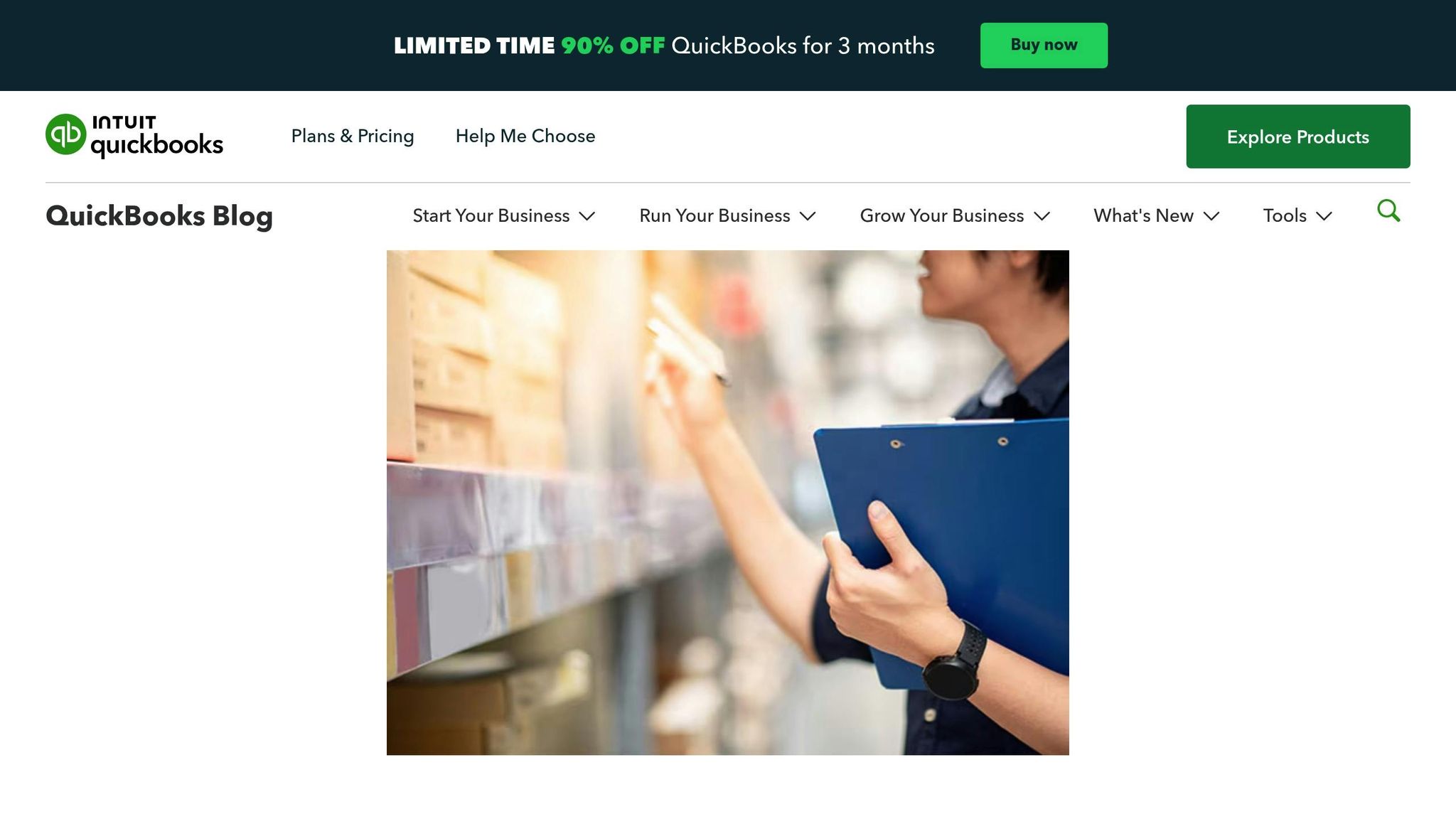
QuickBooks Commerce simplifies inventory management for Bahraini SMEs by seamlessly connecting with QuickBooks Online. This integration offers an efficient way to manage inventory and costs, particularly benefiting online retailers and businesses operating across multiple sales channels.
Real-Time Inventory Tracking and Insights
With QuickBooks Commerce, you get real-time updates on stock levels across all channels. By using tools like barcode systems, RFID, IoT technology, and AI-powered cloud computing, the platform helps reduce inventory discrepancies by up to 85%. This level of instant visibility not only prevents overselling but also ensures smoother warehouse operations.
AI-Driven Forecasting Tools
QuickBooks Commerce taps into Intuit's advanced AI capabilities to forecast inventory needs. By analysing historical sales data, it considers factors like seasonal trends, customer behaviour, and geographic influences. Intuit's Generative AI Operating System (GenOS) further enhances these predictions, processing an impressive 58 billion machine learning predictions daily and identifying trends or anomalies from over 730 million customer interactions each year.
However, as Hector Garcia points out, it's vital for business owners to understand the reasoning behind these AI-driven forecasts. Transparency in how recommendations are made ensures that users can confidently act on them.
Managing Multiple Sales Channels
QuickBooks Commerce makes handling multi-channel operations much easier. By consolidating orders from various e-commerce platforms, it provides a unified view of inventory. Automatic updates on stock levels and multi-currency support mean businesses in Bahrain can efficiently manage both local and international sales.
Seamless Integration with Platforms
The platform integrates effortlessly with popular e-commerce platforms like Amazon, eBay, and Shopify, reducing the need for manual data entry and minimising errors. Its cloud-based design and access to the QuickBooks App Store expand its functionality. Additionally, with built-in multi-currency and VAT support, it’s tailored to meet the compliance needs of Bahraini businesses within the GCC market. Further enhancements to its integration with QuickBooks Online are already in progress.
7. Oracle NetSuite WMS
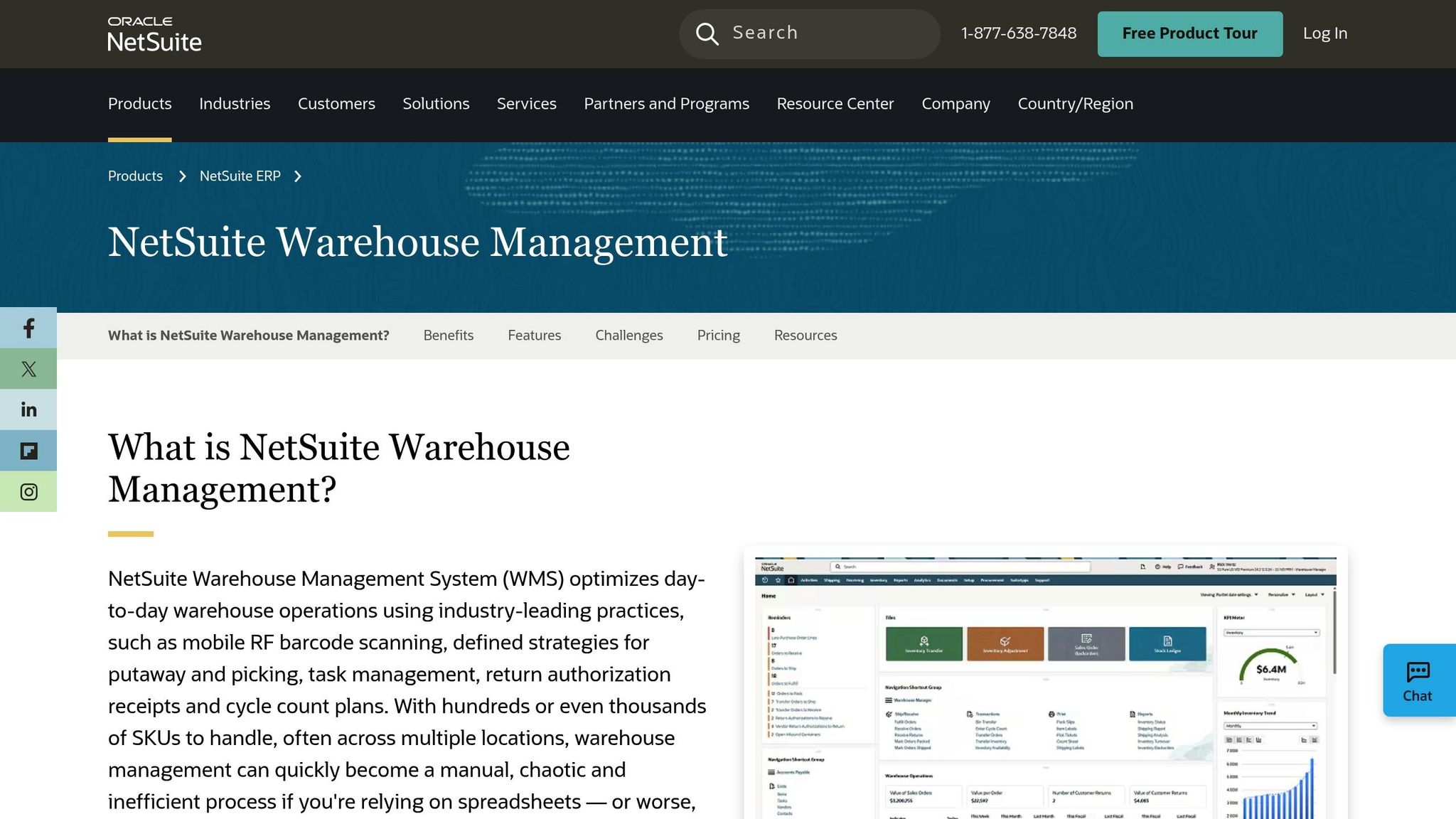
Wrapping up our review, Oracle NetSuite WMS offers advanced integration and inventory tools tailored for efficient warehouse management. This cloud-based solution connects inventory tracking with ERP functions, making it a valuable choice for Bahraini businesses looking to streamline operations across multiple locations and channels. Its seamless integration with NetSuite's broader ERP ecosystem ensures unified business management.
Real-Time Inventory Tracking and Analytics
NetSuite WMS provides full visibility into inventory movements, from the moment items enter the warehouse to when they leave. This real-time tracking ensures that all teams have access to up-to-date data, eliminating the need for constant manual synchronisation.
The platform’s mobile app enables users to handle receiving, putaway, picking, and packing directly from their devices. This feature is particularly useful for Bahrain’s busy logistics hubs, where speed and accuracy are essential.
A standout feature, NetSuite Smart Count, automates inventory counts without halting operations. The process can be completed entirely on a mobile device, maintaining workflow continuity while ensuring precision. Action Health, for instance, reported a 20% increase in productivity after implementing this system. CFO Phil Negri shared:
"We have seen a 20% improvement to employee productivity since implementing NetSuite WMS and the related process changes."
AI-Powered Forecasting Capabilities
NetSuite leverages AI to simplify tasks and deliver actionable insights. The Supply Chain Control Tower uses AI to simulate inventory supply and demand, enabling businesses to align customer orders with available stock.
Another feature, NetSuite Planning and Budgeting, identifies trends and provides predictive commentary. This helps finance teams understand the key factors driving AI-generated forecasts. NetSuite emphasises the importance of unified data, stating:
"The best AI comes from the best data, and the best data is from a unified suite. One system, One data source, better AI."
These tools integrate seamlessly with other operational systems, offering businesses a comprehensive approach to inventory planning.
Integration with Local and Global Platforms
NetSuite WMS enhances efficiency through its shipping system integration. The NetSuite WMS Shipping Integration connects NetSuite with parcel carrier software, automating outbound tasks.
Globally, NetSuite supports 190 currencies, over 20 languages, and operates in 219 countries and territories. The NetSuite OneWorld module offers automated tax calculation and reporting in more than 100 countries, with a flexible tax engine that supports VAT compliance in over 110 countries.
For example, M.R.S. Packaging, a food and beverage distributor operating across nine Middle Eastern countries, has relied on NetSuite since 2015. They use it for financials, CRM, inventory management, and HR, and have adopted NetSuite OneWorld to manage subsidiaries in Bahrain and the UAE. Managing Director Manu Soni noted:
"NetSuite has proven to be the most cost effective, user friendly system for a midsized company like ours."
Another success story is EQI, a supply chain solutions provider. By implementing NetSuite WMS, they eliminated manual processes and gained real-time data access. For incoming shipments, employees scan container numbers to instantly view contents. Curtis Beene, Manager of IT Operations at EQI, praised the transition:
"It was a great experience. We went live without any interruptions on the production floor. And, we didn't experience any challenges. The transition was seamless."
NetSuite WMS’s AI capabilities and unified integration make it an excellent solution for dynamic inventory environments in Bahrain. Businesses can subscribe to NetSuite through an annual licence fee, which includes the core platform, optional modules, and user access. NetSuite WMS is available as an add-on module, making it suitable for companies of varying sizes across the GCC region.
Feature and Price Comparison
Finding the right forecasting tool means balancing features with your budget. The seven cloud solutions reviewed here cater to a variety of business sizes and operational needs in Bahrain. To help you decide, the table below highlights their key differences.
| Tool | Key Features | Best For | E-commerce Integration |
|---|---|---|---|
| Omniful | Real-time tracking, dark store management, 2–3 hour delivery | Medium to large enterprises | Shopify, WooCommerce, Magento |
| Zoho Inventory | Multi-channel sync, automated reordering, VAT compliance | SMEs to mid-size businesses | Amazon, Shopify, Magento, WooCommerce |
| LOGIC ERP | Comprehensive ERP integration, local compliance | Large enterprises | Custom integrations available |
| SAP EWM | Advanced analytics, VAT/customs compliance | Large enterprises | SAP ecosystem integrations |
| Blue Yonder | AI-powered forecasting, supply chain optimisation | Large enterprises | Multiple platform support |
| QuickBooks Commerce | Multi-channel management, B2B order processing | SMEs to medium businesses | Various e-commerce platforms |
| Oracle NetSuite WMS | AI forecasting, support for 190 currencies, mobile app | Medium to large enterprises | Global platform integrations |
Note: Pricing depends on specific configurations and needs. Contact vendors for current details.
SME-Friendly Options
For smaller businesses in Bahrain, tools like Zoho Inventory and QuickBooks Commerce offer great value. Zoho Inventory stands out for its smooth e-commerce integrations with platforms like Amazon, Shopify, Magento, and WooCommerce, making it ideal for managing online sales. QuickBooks Commerce is another strong pick, especially for businesses juggling B2B orders alongside retail operations.
Enterprise Solutions
Larger businesses with more complex operations will find robust solutions in SAP EWM and Oracle NetSuite WMS. SAP EWM ensures compliance with VAT and customs regulations, crucial for companies operating across the Middle East and Europe. Meanwhile, Oracle NetSuite WMS supports 190 currencies and operates in 219 countries, making it perfect for global businesses. With AI-driven forecasting, it helps predict inventory needs, ensuring customer orders align with stock availability.
Regional Integration Capabilities
Some tools are tailored specifically for the GCC market. Omniful WMS, for instance, caters to Middle Eastern businesses with features like dark store management. A great example is The Laverne Group in Saudi Arabia, which achieved 100% inventory accuracy and 2–3 hour delivery times in Riyadh using Omniful’s integrated OMS and WMS solutions.
Scalability and Long-Term Value
Cloud-based solutions bring flexibility, security, and scalability, making them a smart choice as your business grows. Features like real-time tracking, barcode scanning, automated reordering, and demand forecasting are particularly useful for expanding operations.
Trial Periods
Free trials are a great way to test these tools. They allow you to explore user interfaces, integrations, and reporting features to ensure the solution aligns with your operational needs [64–66]. With these comparisons and trial options, you’ll be better equipped to choose the right tool for your business.
Final Thoughts
Selecting the right cloud-based inventory forecasting tool can bring a significant shift in how Bahraini businesses operate. The tools highlighted here each offer unique features, catering to different needs - from Zoho Inventory's multi-channel support for growing SMEs to SAP EWM's enterprise-level compliance for larger organisations.
These tools aren’t just about convenience; they deliver measurable results. A robust system can slash labour costs by 30–50%, boost inventory accuracy to 99%, and double the speed of order fulfilment. For businesses navigating Bahrain's competitive landscape, these gains mean happier customers and healthier profit margins.
"Choosing a new software vendor will impact the efficiency and profitability of your organisation for years to come. Thus, it's not a process to be taken lightly." - Oliver Munro
While budget constraints are a key consideration, not investing in advanced tools can lead to costly issues like stock mismanagement, delays, and lost revenue.
Security concerns are another common hesitation, but cloud-based solutions often offer stronger protection than on-premise systems. In fact, 36% of respondents in a recent study indicated that cloud services provide better security than they could achieve on their own.
Beyond cost and security, it’s crucial to ensure the tool aligns with your operations. Start by analysing your current processes to pinpoint bottlenecks, then involve your team in software demos to find the best fit.
Scalability should also be a priority. Opt for a system that integrates seamlessly with your existing platforms and supports growth, whether you're expanding locally in Bahrain or across the GCC. From small retail shops to large distribution centres, the right tool can adapt as your business evolves, all while offering the flexibility to operate from anywhere in the region.
Finally, track the system’s performance after implementation to ensure you’re getting the most out of your investment. The right choice today will not only streamline your inventory management but also fuel your business growth in Bahrain’s competitive market for years to come.
FAQs
How can AI-powered tools improve inventory forecasting for businesses in Bahrain?
AI-driven tools are transforming how businesses in Bahrain handle inventory forecasting. By delivering precise demand predictions, these tools help maintain optimal stock levels, preventing the headaches of overstocking or running out of key items. They work by analysing historical sales data, market trends, and customer behaviour, offering insights tailored specifically to your business.
On top of that, these tools can automate tasks like restocking and flagging issues such as theft or wastage. This not only streamlines operations but also boosts overall supply chain efficiency. By cutting unnecessary costs and improving resource management, AI solutions enable businesses to thrive in Bahrain’s fast-paced market.
What should I look for when selecting a cloud-based inventory forecasting tool for my business in Bahrain?
When selecting a cloud-based inventory forecasting tool for your business in Bahrain, prioritise data integration, predictive accuracy, scalability, and user-friendliness. These features will help the tool align with your business operations while delivering dependable forecasts.
You’ll also want to assess how well the tool handles demand fluctuations, seasonal patterns, and supply chain challenges - all essential for effective long-term planning. Make sure it accommodates local needs, such as using the Bahraini dinar (BHD), Bahrain’s date formats, and metric measurements, to ensure smooth and efficient operations.
What are the benefits of integrating e-commerce platforms with inventory management systems for businesses in the GCC region?
Integrating e-commerce platforms with inventory management systems brings real-time inventory tracking to life, especially across multiple sales channels. For businesses in the GCC region, this means avoiding the headaches of overstocking or running out of products. By keeping product availability accurate, operations run more smoothly, and customers are happier when they can get what they need without delays.
What’s more, automating stock updates cuts down on manual work and reduces the chances of errors. This not only saves time but also streamlines effort, letting businesses focus on growth. Such integration also enables a smooth omnichannel experience, making it easier to cater to a variety of customer preferences. For GCC businesses navigating a fast-changing market, these advantages are key to staying ahead of the competition.